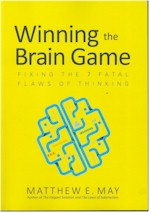 |
|
|
| ||||||
|
|
This page is the original source of this review, though you may also find it on Amazon or other sites. | ||
| Book Reviews Home | Free Audio Books | |
 |
Book Review of: Winning the Brain GameFixing the 7 Fatal Flaws of Thinking Price: $13.25 Availability: Usually ships within 24 hours |
| Review of
Winning the Brain Game, by Matthew E. May (Softcover, 2016) (You can print this review in landscape mode, if you want a hardcopy) Reviewer: Mark Lamendola, author of over 6,000 articles. I highly recommend this book. In my expert opinion, it is a "must read" for anyone who values the power to (really) think. What makes me an expert? In addition to having an IQ more than three standard deviations above the mean, I've been publishing the Brainpower Newsletter for over 15 years and have a lifestyle geared toward improving on what brainpower I've got. For example, I listen to recorded university lectures rather than music. As for thinking itself, I am one of the relatively few to achieve a perfect score on the Watson-Glaser test of reasoning. So, yes, an expert in this area. Still, I learned much in reading this book! One of my observations about intelligence is there is raw intelligence (your native ability) and effective intelligence (the degree to which you use that raw ability). What most people lapse into is a lazy state of not using their raw intelligence. Even those of use who have very high raw intelligence do this, and I can make a long list of stupid things I have said or done due to not using my raw ability. It's like having a big rollaway toolbox but using your fingers instead of a socket wrench to remove a bolt. That effort fails not because you lack the tools but because you aren't using them. Or maybe you use them, but incorrectly; for example, you've got the ratchet set to tighten. This book address that dynamic, but from a perspective I hadn't, uh, thought of before. The essence is you have your autopilot "fast brain" that snaps out quick decisions based on patterns and other stored information; you also have your "slow brain" that can apply your full intelligence to a particular problem or situation. You can't stop the autopilot, but you can trick it into handing off the problem to the "slow brain." Mr. May provides specific, actionable advice on how to do this depending upon the particular situation. I'm not sure there are exactly seven fatal flaws of thinking. My "fast brain" says "the seven" is a bit presumptuous. My "slow brain" says don't overanalyze it; the list pretty much covers everything. So let's just say that if you're fairly typical as far as thinking goes and overcome the seven fatal flaws that Mr. May discusses, your effective intelligence will increase by orders of magnitude. I'm quite atypical (I took his "insight quiz" and missed only a few of the questions), but still found significant room for improvement. I still found, "Hey, I do that!" examples in his discussions of some of these flaws. For several reasons, it would not be helpful for me to list all seven flaws. If you're interested in thinking better, get the book. But I will name one flaw. My "fast brain" says to take the first one, so that's probably a bad decision. But let's go with it. The flaw is called "leaping" and your "fast brain" probably translated that into "leaping to conclusions." If so, you need this book! You just leapt! Mr. May illustrates each of the seven flaws by discussing actual case histories that illustrate both the flaw and the "slow brain" solution to the problem. In each case, he presents the problem with the same parameters and constraints originally encountered. He invites you to solve it yourself. In the first problem he presented, I almost immediately hit upon a solution. But he wanted an "elegant" solution, and mine was too simple. As it turned out, that was exactly the solution. I don't know if I was misled by his word choice or if committed the fatal thinking flaw from Chapter 7. Coming up with the answer might lead me to engage in the fatal thinking flaw of Chapter 3! Early on, I mentioned my qualifications for reviewing a book on this particular topic. But what are Mr. May's qualifications for writing it? He's a noted though leader on strategy and innovation, having a long consulting career in that area. He's worked with the LAPD and other government agencies plus the private sector, and he's been all over the world doing it. Also, he's led hundreds of interactive creative sessions. However, it's not just his own qualifications he brings into play here. One of the hallmarks of really smart people is they tap other really smart people. Mr. May tapped some very impressive individuals in the writing of this excellent book, getting their input and insight. In addition, he's got a pretty impressive bibliography. This book isn't very large. The form factor is about half-size; that is, you could lay two of these on top of a "typical" book. That really gives you about 90 pages of text, but what's packed in there provides a "value density" of maybe 500 pages. For those who value clear thinking, this book is definitely something to add to your collection. If you already have books on critical thinking, logic, or related topics, fine. A serious reading of this book will help you leverage what you learn(ed) from those other books. This isn't some "new age" baloney book. The author really does know what he's talking about, and the book has real practical value for people who desire to make the most of their native intelligence. | |
| |||||